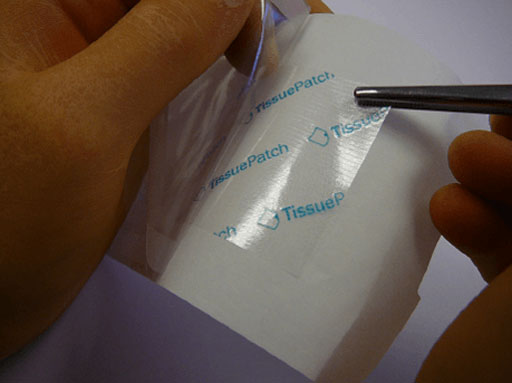Sealant Film Minimizes Air Leaks in Complex Lung Surgery
By Daniel Beris
Posted on 09 Dec 2016
An innovative sealant film that minimizes air leaks during lung surgery leads to shorter duration of indwelling chest drains and reduced length of hospital stay.Posted on 09 Dec 2016
The Tissuemed (Leeds, United Kingdom) TissuePatch is self-adhesive surgical sealant film with a multi-layer structure. On one surface is a bioadhesive polymer that bonds to the various tissues; the other surface is composed of non-adhesive poly lactic-co-glycolic acid (PLGA), which provides favorable structural characteristics, ease of handling, and can potentially prevent post-surgical adhesions. The TissuePatch film cut be cut to any size, and fully resorbs over 12 weeks.

Image: The TissuePatch helps to seal air leaks in lung surgery (Photo courtesy of TissueMed).
In a recent study of 255 patients undergoing video assisted lung volume reduction surgery (LVRS) conducted at Glenfield Hospital (Leicester, UK), a statistically significant reduction in drain time and length of stay was seen in 86 TissuePatch patients, compared to 169 patients in whom lung tissues was closed using buttressed staple only or in conjunction with a traditional liquid glue, with the difference becoming even further marked in older patients and those at highest risk. The study was presented at the 35th annual congress of the Italian Thoracic Society, held during October 2016 in Rome (Italy).
“At Tissuemed we are proud that our years spent developing TissuePatch yielded a product that can help improve patient outcomes,” said David Mandley, MD, CEO of Tissuemed. “It’s very rewarding to see independent confirmation that our efforts can really help to deliver cost savings to healthcare providers, as well as the benefit for patients of reduced time on a chest drain and days in hospital.”
Persistent post-operative air leakage following lung surgery can be problematic, and is associated with a host of complications including infection, higher mortality, and even re-operation. In addition, patients with persistent air leaks remain on indwelling chest drains for longer and remain in hospital until the leakage has resolved. Consequently, thoracic surgeons are willing to go to some lengths to avoid air leakage, or at least minimize their likelihood.
Related Links:
Tissuemed
Glenfield Hospital












.jpg)

.jpg)